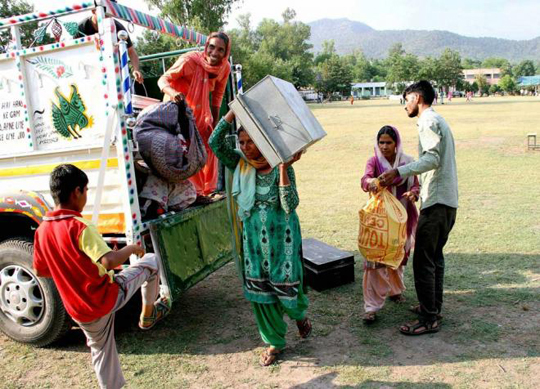Jammu, May 14: Pakistani troops heavily shelled areas along the LoC in Rajouri district for the second consecutive day today, causing heavy damage to buildings and forcing evacuation of 1000 border dwellers.

The Indian Army effectively retaliated.
Pakistan Army had yesterday pounded civilian areas and forward posts along the LoC in Nowshera area with mortars, killing two civilians and injuring three.
"Pakistani Army has resorted to indiscriminate firing of small arms, 82 mm and 120 mm mortars from 0645 hours along the Line of Control in Rajouri sector", a Defence Spokesman said.
"The Indian Army posts are retaliating strongly and effectively. The firing is presently on", he said.
Deputy Commissioner, Rajouri, Shahid Iqbal Choudgary said fresh ceasefire violation has been reported in 'chitibakri' area of Chingus in Rajouri today.
"Heavy shelling started in Manjakote area of Rajouri at O620 hours. More than seven villages have been affected", the DC said.
Choudhary said there was massive damage to buildings.
He said the number of migrants at relief camps swelled to 978 overnight. Till now 259 families have been evacuated from three villages, he added.
51 schools in Nowshera sector have been closed for an indefinite period while 36 in Manjakote and Doongi zones have been closed for three days. 4,600 students study in 87 schools, he added.
After the Pakistani shelling, 1000 people were evacuated from various areas along the LoC in Rajouri district to safer places.
"Risking their lives officials and police evacuated 996 people from various shelling hit villages and shifted them to various camps established by district administration where facilities of ration, cooking, drinking water, sanitation, first aid and proper accommodation have been provided," Choudhary said.
So far, three camps have been made operational and 28 others notified in wake of expected migration from affected villages, Choudhary said.
"Six ambulances have been pressed into action for shifting of injured and treatment. One mobile medical unit was stationed at Nowshera and another deputed to forward areas," he added.
Around 120 officers from various departments have been deployed to organise facilities at relief camp.
The district administration has provided immediate relief and financial assistance to the next of kin of the deceased and to the injured, he said.
A control room has been established in the office of SDM Nowshera for coordination.
The government had last month said that Pakistani security forces had violated the ceasefire 268 times in the last one year.
The ceasefire between India and Pakistan came into force in November 2003.





Comments
Add new comment